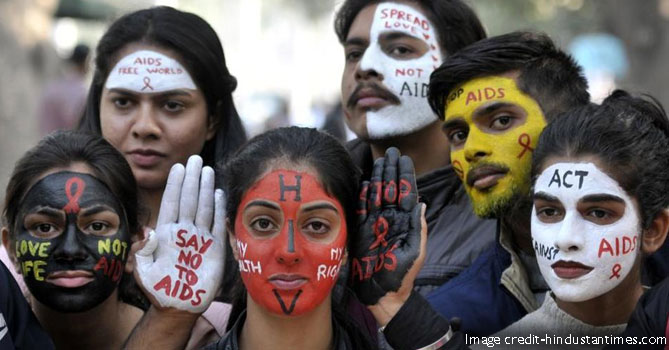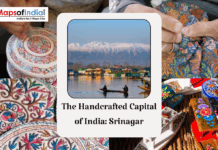
India stands on third spot globally in AIDS infected people
HIV/AIDS is the abbreviated form of Human immunodeficiency Virus and Acquired Immune Deficiency Syndrome. It is a disease spectrum which affects the immune system of an individual and makes the patient susceptible to varied infections like tuberculosis, opportunistic infections and tumours. The last stage of HIV is AIDS.
AIDS originated in West Africa in the 1970s. It is transmitted through sexual intercourse, which is the primary cause of the infection. The secondary causes include transfusion of blood from an infected person, contaminated needles, from mother to child during pregnancy and breastfeeding by an infected person.
India on 3rd spot
According to a report by the UN, India has the third-highest number of people infected by AIDS. 2.14 million Indians were infected with the disease in 2017, accounting for 4 out of 10 people suffering from AIDS in Asia.
Most affected states in India
As per the 2017 report Mizoram had the highest adult HIV prevalence 2.04%, in the country, followed by Manipur 1.43%, Nagaland 1.15%. Telangana 0.70%, Andhra Pradesh 0.63%, Karnataka 0.47%, Goa 0.42%, Maharashtra 0.33%, and Delhi 0.30% were the other states and Union Territories with adult HIV prevalence higher than the national average,
The Vulnerable
Homosexuals, sex workers (including male sex workers) and drug abusers are the most susceptible to this disease. Transgender people are also emerging as a group which is at a high risk of getting infected with HIV. Because of stigma and discrimination, people belonging to these groups do not approach the healthcare facilities at the right time and by the time they seek medical attention, they are in the final stages of AIDS. In fact, the survey shows that HIV treatment coverage is only 36 per cent in India, where 51 per cent of AIDS-related deaths occur.
Truck drivers on high risk
Studies show that in India, truckers are also highly vulnerable to HIV transmission due to their unusual lifestyle. They have to stay away from the family for long periods of time. Most of the truck drivers are alcoholic or use other types of intoxicants. Most of these truckers, comprising 36 per cent of the clients of sex workers, engage in high-risk behaviours.
Education and Prevention
It is essential for the people of India, especially the vulnerable sections, to be educated about the cause, prevention and treatment of the disease. Sex workers need to be counselled about the fatality of the disease and encouraged to use precaution of condoms at all times. It is time for people of India to realise that homosexuals are very much a part of our society and once they are accepted, they will also be easily accessible for HIV treatment. There is a need for sex education in schools
Sex education is the need of hour
It is also important to educate people regarding the social ostracism that HIV infected people face. It is important for people to know that AIDS does not spread through touch or breathing the same air. Education about the disease will stop discrimination against infected people.
Funding and Treatment
The first HIV case was detected in the year 1986, among the sex workers in Chennai. The first successful antiretroviral regimens were available in 1996. However the prices were unaffordable and people who had property, had to sell whatever they had for treatment, while the poor just bore the brunt of the disease and perished. On 1 April 2004, in response to years of advocacy by PLHIV (People Living with HIV) leaders like Ashok Pillai and Rajeshwari, theGovernment of India began a free antiretroviral treatment (ART) programme at eight centres in six high-prevalence states that has now grown to a network of 1,251 ART and Link ART centres across India. Today, free ART is accessed by over 768,000 PLHIV at these centres.
While the past decade has shown a considerable step had been taken towards accessibility to AIDS medication, there is an urgent need to define a clear roadmap for a scale-up of treatment, so that it reaches the maximum number of people in the most remote corners of India. There are still many people all over India who are suffering from AIDS and do not have any access to treatment.
WORLD AIDS DAY
World AIDS Day is observed on 1 December every year. It is dedicated to raising awareness of the AIDS pandemic. This day is also devoted to mourning those who have died of the disease. Government and health officials, non-governmental organisations and individuals around the world observe the day, often with education on AIDS prevention and control. It is a day when people vow solidarity towards those suffering from the disease with a promise that they are not alone in their struggle.
Hope for the AIDS patients in India has arrived in the form of an “HIV/AIDS Bill” submitted to NACO in 2006. The bill was finally introduced to the Parliament at the beginning of 2014. After few amendments to the original 2014 bill, Rajya Sabha then passed the bill on 21 March 2017 after that it was moved to Lok Sabha and the lower house had given its verdict on 11 April 2017. It received Presidential assent on 20 April 2017 and became effective from 10 September 2018.
Bill prohibits discrimination
“The Bill prohibits discrimination in employment, education, healthcare, travel and insurance and calls for a legal commitment by the government to provide free antiretroviral treatment (ART). Moreover, it recognises a person living with HIV right to privacy and confidentiality about their HIV status”.
It is time for us to break free of superstitions regarding HIV, educate ourselves about the disease and while staying safe, help those who have been infected. It is time for solidarity. For where there is solidarity there is always a ray of hope for a better future. It’s time for a better tomorrow.
Related Links:
12 Common Myths About AIDS Debunked
Why is Sex Education Important in India?





